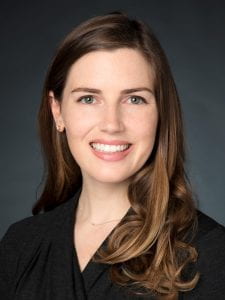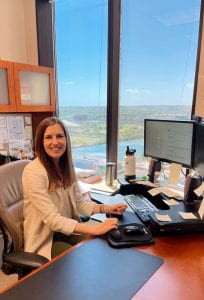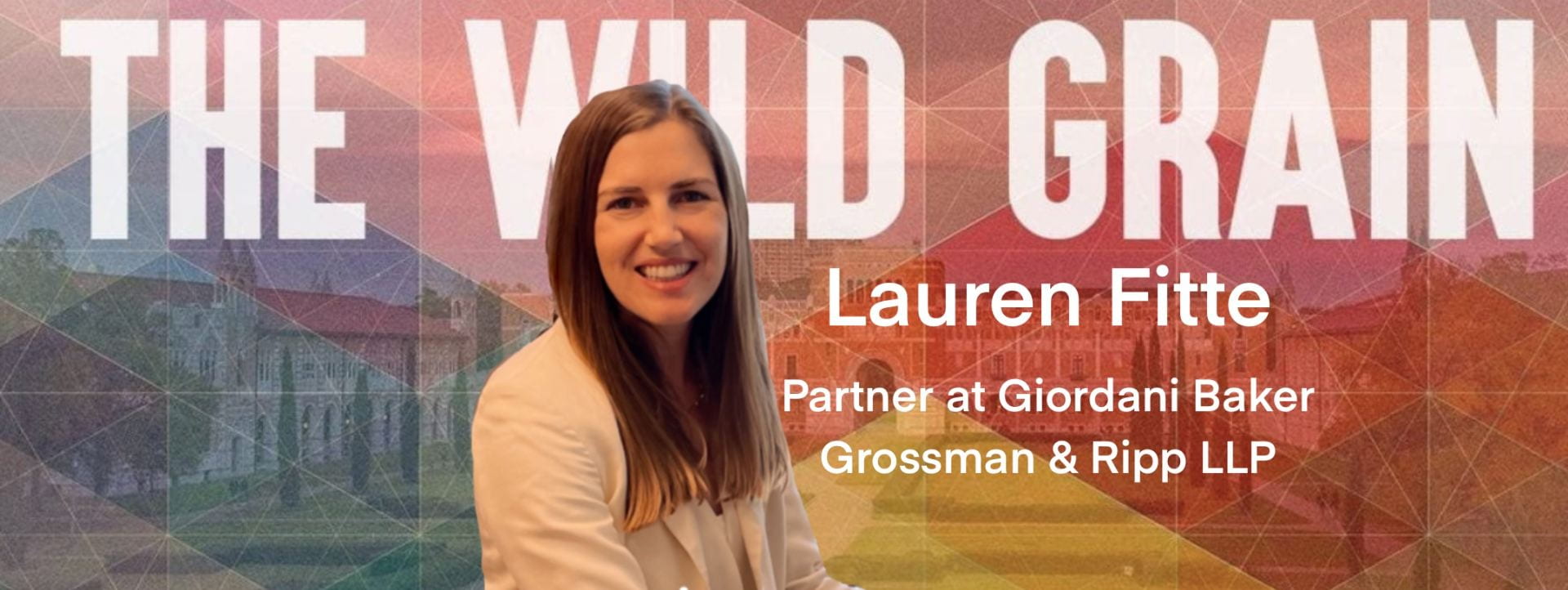
Lauren Fitte (08′) majored in English with interests in creative fiction writing and hispanic studies. She works as an estate planning attorney with a niche focus on international trusts, estates, and closely-held businesses and the related tax reporting and compliance that accompany these structures. Now, she is a partner of a boutique estate planning firm in Austin, which primarily represent high net-worth families, both in and outside of Texas, as well as non-U.S. clients who have U.S. interests.
When did you graduate from Rice? What has post-graduation life been like for you?
I graduated in 2008 with a B.A. in English. At the time, Rice did not have minors, but if it had, I would also have graduated with a minor in Spanish. I was 3 hours shy of a double major in Hispanic Studies. Post-graduation I tried out working at a law firm to make sure that law school was a good plan for me. I worked for two years, then quit and took 6 months to backpack through South America (best decision ever), then returned for law school at UT Law. I’ve been practicing in Austin ever since.
What experiences (pre-undergrad, at Rice, or post-graduation) influenced your decision to pursue this career?
During my junior year at Rice, I decided to try to get an internship for the summer at a law firm. I sent out resumes and cold-called a number of Big Law firms in downtown Houston. I didn’t know if I wanted to go to law school and figured that I should get a job at a law firm so I could see what being a lawyer was like. I was hired into the Client Relations/Business Development department at a major Texas law firm. Most of the staff in this group were marketing professionals and much of the work was focused on helping partners maintain existing client relationships and target new clients in the industries in which the firm had special expertise (oil and gas, energy projects, M&A, etc.). Being a paralegal might have given me more insight into the practice of law itself, but in hindsight, working on business development gave me more access to partners and a view into the business of running a firm and the work that goes into keeping and gaining relationships with large corporate clients—much of it is based on the human to human connections between the attorneys at the firm and the in-house attorneys at the corporation. Due to the recession in 2008-2009, a lot of my classmates entered a world of hiring freezes and there was a lot of uncertainty in the job market. This definitely motivated me to more seriously consider going to law school, so I took the LSAT and applied after taking two years to get work experience after undergrad. I think work experience was a benefit when it came time to study and take law school seriously, but it’s also possible to take no time off before law school and do fine—you just have to be ready to level up and do some serious studying.
What line of work are you currently in, and how long have you been doing it for? What does it entail, and what do you enjoy about it?

I am an estate planning attorney with a niche focus on international trusts, estates, and closely-held businesses and the related tax reporting and compliance that accompany these structures. I am a partner of a boutique estate planning firm in Austin and we primarily represent high net-worth families, both in and outside of Texas, as well as non-U.S. clients who have U.S. interests (property, heirs, beneficiaries). I enjoy being a trusted advisor to families as they design and carry out their estate plans for future generations, while navigating tricky tax implications applicable to multi-jurisdictional families. Many of my projects are for clients who I have represented for years, some even for my entire career (9 years in practice).
What are some of the most interesting/exciting projects that you have worked on? What is something that surprised you in your current line of work?
Many of our clients are the first generation of wealth. It is always rewarding when a client has built a very successful business and has an opportunity to sell a stake in it—what we call a “liquidity event.” There is a lot of tax planning involved and I enjoy being part of the discussion of how best to hold and invest the fruits of my client’s labor and to ensure we can help them to accomplish the goals they have for wealth preservation for future generations and charitable giving. One thing that has surprised me is that, for my practice at least, every day is different and I don’t get bored. Tax laws are constantly changing, so I’m always learning and challenged by what I do.
How did your training in the English major help you with the type of work you’re currently doing? What would you say is the strength of a training in the humanities and its application beyond the university in the “real world”?

Practicing law as a transactional attorney is 100% reading and writing. Even as a trial lawyer, much of your day is spent reading over discovery materials, drafting motions, and doing legal research. You have to enjoy the solitude of quietly reading and writing. I admit that practicing law kind of drains the creativity out of the writing process, but with that said, in any law practice there will be times that you need to distill a complex legal concept into plain English for a client to understand. I take pleasure in taking the time to explain the legal issues to the client to make sure they fully understand the legalese that I’ve drafted for their contract/estate plan/deal, etc. I think a background in the humanities, in any major, gives you plenty of opportunities to hone your writing and reading comprehension and just generally makes you a more well-rounded and interesting person to have at a dinner party.
What do you most fondly remember from being a Rice English major? What was your favorite English class at Rice and how has that influenced you?

I loved my Creative Writing Fiction class—it really pushed me outside of my comfort zone and forced me to finally write a couple of short stories, which I always said I wanted to do. I can’t say that I’ve found the time to do that now that I’m an attorney, but maybe one day I’ll find the time… I also absolutely loved my Shakespeare course, “American Fiction” with Professor Doody, and “American Poetry” with Professor Wolfe. It felt like I majored in “Reading for Pleasure” because I enjoyed the reading lists and then got to listen to my brilliant classmates and professors debate about the author’s intent and the intertextuality of poetry by T.S. Eliot and Ezra Pound. Also, “Postmodernism” with Professor Morris was amazing… Writing an essay about Sgt. Pepper’s Lonely Hearts Club Band felt like being told I could eat ice cream for dinner.
What advice would you give, if you could, to your undergraduate self?
I think there are two schools of thought: (i) You know exactly what you want to do, so you go down that path and check all the boxes and line up the internships, or (ii) You have no idea. If you have no idea, I recommend taking everything that sounds interesting to you. Talk to alumni about what they do, what the like, what they hate. Try not to be motivated by salary expectations and just focus on what you like to learn and then work on becoming an expert at that thing—success will come to you. Also, make time to travel at every opportunity while you’re a student, either by doing a study abroad program, traveling after graduation or before you start a big job—whatever you can manage. You may not have a lot of money while you’re a student, but you have time and the lifestyle to be okay with traveling on a budget. There’s no better time to see as much as possible.
